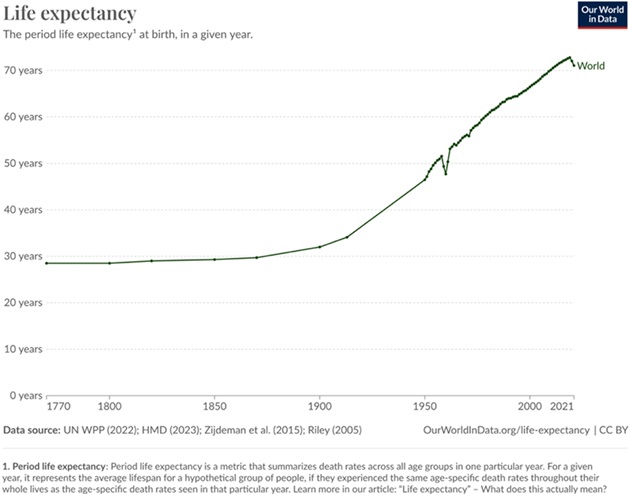Editor’s Note: Today, we’re sharing an exclusive look at the introduction to April’s issue of Disruption Investor.
Read on to get Stephen’s take on what he believes is the next transformational megatrend… and how it will help us live healthier, happier, longer lives.
***
Matt Ridley (the original Rational Optimist) and I talked about the next big megatrend over breakfast in London a few weeks ago.
Megatrends are ignited by transformational innovations. Matt pointed out they typically come in 50-year waves.
His grandparents were born before cars. They lived to see a man walk on the moon and supersonic jets in the skies. Transportation was transformed in one lifetime.
Matt enjoyed the digital revolution. He grew up using rotary dial phones. Now, he and five billion others carry smartphone supercomputers in their pockets.
Matt and I agree biotech is the next transformational megatrend.
A mechanic can pinpoint almost any problem with your car instantly. Yet a doctor will often put a human through a gauntlet of medical tests… and still not have the foggiest idea what’s wrong.
My aunt, a seemingly healthy, active, 55-year-old, recently suffered a major stroke that left her paralyzed from the waist down. Turns out her brain was full of amyloid plaque, which causes toxic damage to nerve cells.
You’d think if you were on the verge of a major stroke, you’d feel a little “off.” But my aunt felt fine, with zero symptoms. How many times have you heard of similar tragedies?
The human body remains largely a mystery. We’ve barely scratched the surface of what’s possible when it comes to curing disease.
That’s about to transform.
We’ve seen many biotech breakthroughs over the past decade. Now, we’re starting to see regulatory approvals and new products.
Late last year, the first-ever gene editing (CRISPR) therapy was approved in the US and the UK. This tech allows scientists to “delete” diseases from our bodies and “insert” healthy cells.
Now there are clinical trials with a new and improved type of gene editing that allows doctors to edit cells inside patients’ bodies.
This is a game-changer for two reasons…
#1: Most cells can’t be extracted for editing, so we’ll be able to tackle more diseases.
#2: It’s far less expensive, as it doesn’t require the labs and expertise needed to extract cells. This will make treatment more affordable.
|
I can’t overstate how huge a deal this is.
Diseases from breast cancer to Alzheimer’s are caused by a few bad genes. By editing a handful of them, we could all but eliminate whole classes of ailments.
Scientists are also on the cusp of achieving a holy grail: blood tests that can detect Alzheimer’s at a very early, pre-symptomatic stage.
Researchers in the UK built a ChatGPT-like AI model to sift through 1,500 blood markers. They were able to predict Alzheimer’s with 90% accuracy… nearly 15 years before people were diagnosed… all with a routine blood test.
By the time we catch Alzheimer’s today, it’s almost always too late. Early detection means patients could be treated with the first Alzheimer’s drug approved by the FDA last year.
Matt said he’s lost count of the number of times people have asked him, “You’re not still an optimist after COVID… Russia’s invasion of Ukraine… and the Syrian civil war, are you?”
He counterpunches with facts about how the number of people living in extreme poverty fell by 137,000 yesterday… and the day before that… and the day before that… and each day for the past 25 years.
And Matt believes the advances we’re seeing in biotech are among the greatest reasons for optimism going forward.
Heart diseases and cancers are responsible for half of deaths globally. Combined, they kill roughly 80,000 people every day.
Biotech is helping us fight these killers with the invention of cancer-killing pills and gene therapies that suck cholesterol from our blood.
And when you marry the biotech revolution with artificial intelligence (AI), the possibilities get wild.
Imagine having a medical expert at your service 24/7 via your iPhone. With daily scans of your retina… measures of your heart rate variability… and sleep tracking, the doctor in your pocket will diagnose your illness before you even feel sick.
This isn’t some sci-fi fantasy. Our research suggests this future is achievable in the next few years.
Global life expectancy has doubled over the past century. A child born today can expect to live twice as long as someone born 100 years ago, on average:

Source: Our World in Data
The biotech revolution will fuel the next leg higher. We could all be centenarians. These innovations will help us live healthier, happier, longer lives.
That means fewer children growing up without a parent lost to some deadly disease. And grandparents getting to spend more quality time with their kids’ kids.
Your health is your wealth. To quote Confucius, “A healthy man wants a thousand things; a sick man only wants one.”
The transportation age allowed us to reach far-flung regions of the globe. The digital era let us instantly talk with people thousands of miles away. And the biotech revolution will usher in even bigger changes.
I’m excited to explore this incredible future with you—as a human being, but also as an investor.
Stephen McBride
Chief Analyst, RiskHedge
Editor’s note: One way to play the biotech revolution is with a fund like the iShares Biotechnology ETF (IBB). But for a chance at even bigger returns, Stephen and Chris Wood recommend investing in the individual stocks pushing this technology forward.
For example, their latest recommendation solves one of biotech’s biggest problems: how to administer biologics—medicines made from living things—in a way that doesn’t require a long hospital visit to receive treatment.
You can access this little-known stock by upgrading to Disruption Investor today. Click here for details.



